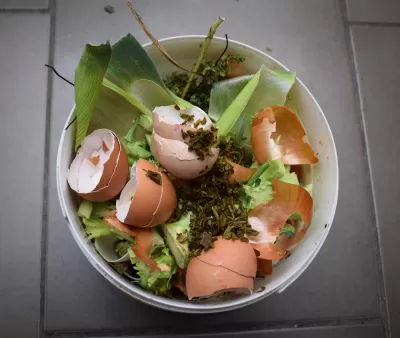Washington, D.C. approved a set of incentives for home composting at the end of March.

Brenda Platt writes a post for the Institute for Self-Reliance, one of the organizations that supported the District of Columbia 's recently approved "Home Composting Incentives Act of 2018."
"We prioritize home composting over residential curbside collection precisely because it does avoid the curb, which in turn saves hauling expenses and tip fees at processing facilities while enhancing residential soils," according to Platt. "One-third of a ton can conservatively be composted at home per household per year. That can add up to a lot of savings for the City."
Included in the bill are several tools for spurring adoption of home composting, including a rebate or voucher for the purchase of home composting system and educational materials and a training program offered by the Department of Public Works.
Cathy Plume picked up the news of the District's new home composting program, which achieved final approval by the Washington D.C. Council after Platt's article was published. According to Plume, the composting program will help D.C. meet the 80 percent waste diversion goal it set for 2032. Plume also adds that D.C. can look to the Austin, Texas rebate program for a model.
FULL STORY: Washington, DC approves bill to incentivize residential composting

Alabama: Trump Terminates Settlements for Black Communities Harmed By Raw Sewage
Trump deemed the landmark civil rights agreement “illegal DEI and environmental justice policy.”

Study: Maui’s Plan to Convert Vacation Rentals to Long-Term Housing Could Cause Nearly $1 Billion Economic Loss
The plan would reduce visitor accommodation by 25% resulting in 1,900 jobs lost.

Why Should We Subsidize Public Transportation?
Many public transit agencies face financial stress due to rising costs, declining fare revenue, and declining subsidies. Transit advocates must provide a strong business case for increasing public transit funding.

Paris Bike Boom Leads to Steep Drop in Air Pollution
The French city’s air quality has improved dramatically in the past 20 years, coinciding with a growth in cycling.

Why Housing Costs More to Build in California Than in Texas
Hard costs like labor and materials combined with ‘soft’ costs such as permitting make building in the San Francisco Bay Area almost three times as costly as in Texas cities.

San Diego County Sees a Rise in Urban Coyotes
San Diego County experiences a rise in urban coyotes, as sightings become prevalent throughout its urban neighbourhoods and surrounding areas.
Urban Design for Planners 1: Software Tools
This six-course series explores essential urban design concepts using open source software and equips planners with the tools they need to participate fully in the urban design process.
Planning for Universal Design
Learn the tools for implementing Universal Design in planning regulations.
Smith Gee Studio
Alamo Area Metropolitan Planning Organization
City of Santa Clarita
Institute for Housing and Urban Development Studies (IHS)
City of Grandview
Harvard GSD Executive Education
Toledo-Lucas County Plan Commissions
Salt Lake City
NYU Wagner Graduate School of Public Service




























